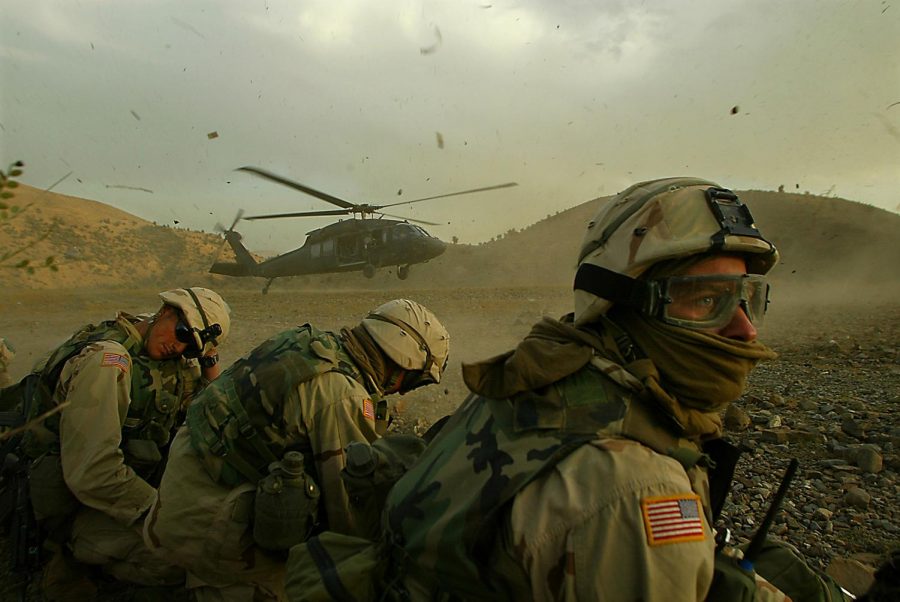Pulitzer Prize-winning photographer inducted into Hall of Fame
November 6, 2014
Days after Sept. 11, 2001, Rick Loomis packed his bag and his camera and headed to New York. For the next month, he would document one of the biggest moments in recent American history: the aftermath of 9/11.
“I really got to cover a slice of American history,” he said.
His journey photographing the aftermath of the fall of the World Trade Center would not stop in New York. For the next few years, Loomis would travel throughout the Middle East, following the United States Marine Corps as they invaded Iraq and Afghanistan, covering many of the battles in the area for the Los Angeles Times.
“September 11 was nearly a decade into my career and… I had done some international assignments, but I had never thought to cover war or anything like that,” he said.
Loomis graduated from WKU in December 1993, after spending years on the Hill in what he considered a nurturing environment.
“(Western) was pretty much amazing,” he said. “We were all energized by what we were learning and just excited to put it into play.”
His bond with WKU and the programs and students here have lead him to want to give back to the university that taught him. Loomis and his wife, Liz Baylen, routinely come back to help with Mountain Workshops, the annual week-long program put on by the WKU photojournalism program.
“It’s my way to give back,” he said. “I’m forever proud of being from WKU.”
While enrolled, Loomis met Dave LaBelle, a former photojournalism professor who now teaches at Kent State.
“He was very passionate, very zealous about his work,” LaBelle said. “He always treated his teachers with respect and he was good to other students… He was just the kind of guy who would do anything for you.”
He and LaBelle, through years in the classroom and trips to Memphis, Tennessee, would form a bond that would last through the years when they both left the Hill.
“I performed his (wedding) ceremony,” LaBelle said. “Rick is kind of like an adopted son and a student and he’s become like a friend and a peer… it feels like family, whenever he does anything, it almost feels like one of my kids.”
Loomis’ skill with a camera took him to the Los Angeles Times in the months after graduation, a publication he still works for 20 years later.
“I spent about three or four months with my life in boxes packed to the ceiling in a kitchen in an apartment… it sort of was a tumultuous time,” he said. “I just started applying for every job I could apply for.”
His persistent application, and a recommendation from former professor Jack Corn, would land him his photographer position at the Times.
Loomis was awarded the Pulitzer Prize, one of the most prestigious awards in journalism, in 2007 for a series he did about the decline of oceans on a global scale.
“It was exhilarating and unexpected,” Loomis said. “My buddy, who I work with a lot, I think he was the first one I told afterwards, or pretty much in the top three people I think I told after it happened, he was excited to tell me, he said ‘you know what you just did?’ and I said ‘what?’ and he said ‘you just wrote the first line in your obituary.’”
LaBelle was right next to him when he accepted the award.
“I’ve got to say that was one of the top 10 moments of my life,” LaBelle said.
Loomis will receive another award this weekend when he’ll be inducted into the Alumni Hall of Fame with two other graduates, David “Doc” Livingston and Col. Gary “Mickey” Riggs, during Homecoming. LaBelle, again, will be by his side to show his support.
“Rick, like any good person, is a product of a lot of influence, a lot of teachers, a lot of experience, and I’m sure I had a small role in that,” LaBelle said. “It certainly makes me feel proud, it makes me feel proud, he’s just surpassed me in so many ways, that’s the ultimate compliment to a teacher really is when their student exceeds what they do, that they become better.”













